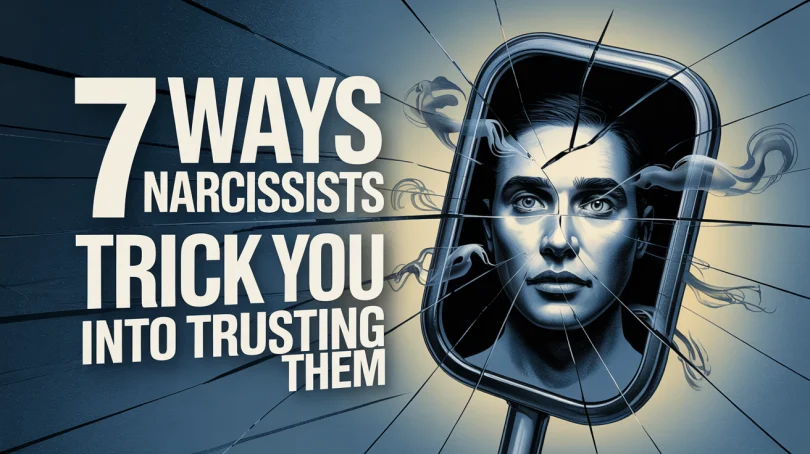Narcissists don’t show up with red flags blazing. They show up with charm, connection, and a kind of closeness that almost feels healing. That’s what makes the crash so disorienting. But none of this happens by accident. The same strategies narcissists use to win you over are also used in cults, casinos, and even marketing. Once you see the pattern, you’ll stop taking it personally, and that’s where your power comes back.
1. They Mirror You to Build Instant Trust
It starts subtly. Maybe they recognize something in you, right away, your worldview, your humor, or even the way you describe your past. They say things that make you feel deeply understood. When they mention a shared interest or experience, it doesn’t feel like a coincidence; it feels like alignment. For someone who’s felt misunderstood or dismissed in the past, that resonance feels like medicine.
But here’s what’s happening: they’re reflecting you to yourself, not because they share your values, but because they’ve picked up on what makes you feel safe and validated. They’re performing it. In social psychology, this is called identity mirroring. While it’s not always manipulative, most people do some version of this when trying to connect; in the hands of a narcissist, it becomes a tool for control, not connection.
They love this tool because it speeds up intimacy, helping you lower your guard. The trick is, you think you’re falling in love with them, but you’re not. You’re falling in love with how you feel around them. That’s the setup. Once they’ve secured your attachment, the mirroring sometimes fades suddenly.
They react with indifference, judgment, or subtle contempt. You try to reconnect, to get back to that version of them who “saw” you, but that person was never real. They were a mask, a reflection designed to draw you in. Now that they have you, they don’t need the mirror anymore.
Related Topics:
6 Brutal Truths About Narcissists Survivors Learn Too Late
5 Sneaky Tactics Narcissists Use to Target Innocent Souls
6 Lies ALL Narcissists Tell (Exposed!)
2. They Love-Bomb You, Then Make You Chase It
There’s usually a moment in the beginning where it all clicks. Conversations flow effortlessly, and the chemistry is intense. You’re not just attracted, you feel chosen, seen, pulled into something bigger than both of you. It might seem like an instant connection, but what’s happening is emotional acceleration.
Narcissists come on strong because intensity creates the illusion of depth. They bypass the natural process of building trust and jump straight to declarations of loyalty, fate, or soul-level bonds. They might even say, “I feel like you’re my soulmate,” or, “I’ve never felt this way about anyone before.” But if you’re dealing with a narcissist, they’ve felt this way about everyone before.
This works because if you’ve been starved for real emotional connection, it’s easy to believe you’ve found something rare, something that comes along once in a lifetime. But it’s not love. The speed of this phase isn’t accidental; it’s part of the setup. Your brain records that emotional high and stores it as a baseline: This is what love feels like, and I want more of it. Why wouldn’t you?
But when that energy suddenly disappears as it always does with a narcissist, you don’t question the relationship. You try to get back to what it felt like in the beginning. Psychologists call this intermittent reinforcement: the intense highs and lows that create an addictive behavioral loop, just like in casinos or social media apps. When rewards are unpredictable, they become more addictive, so you work harder to earn them. Your brain stays hooked, even as the payout fades.
On some level, whether conscious or subconscious, the narcissist knows this. In the beginning, they flood you with affection, but soon that affection becomes conditional. You start chasing it, not because they’re showing you who they are, but because they showed you just enough to make you believe that version of them could come back. That’s how they train you to bond, even as they pull away.
3. They Build an “Us Against the World” Dynamic
At first, this feels like intimacy and trust. They tell you how different you are from everyone else and how rare your connection is. When they talk about people who’ve let them down, they frame you as the exception. You start to feel like you’re on the inside of something sacred.
But what looks like closeness is often isolation in disguise. This is a classic tactic in coercive control, a term coined by Dr. Evan Stark. The goal isn’t to dominate someone all at once; it’s to gradually reshape their reality by limiting outside influence. It doesn’t always come through anger or threats, sometimes it’s as subtle as, “You’re the only one I can talk to,” or, “Let’s just keep this between us.”
This emotional exclusivity feels flattering at first, but over time, you may notice a quiet pressure to pick sides. They might plant seeds of doubt about your friends or family, or take issue when you give attention to anyone else. Because you care about them, you try to be more loyal, more understanding. That loyalty becomes the trap that keeps you stuck.
The more isolated you feel, the more you rely on them for support. Once they’ve positioned themselves as your only safe person, it’s easier for them to distort the narrative about the relationship, the past, or even you.
Eventually, you realize you’ve stopped reaching out to others, not because they pushed everyone away directly, but because they made you feel like no one else could understand. They made you feel like you couldn’t talk about what was happening, even though you desperately wanted to.
Isolation is dangerous, but when they make it seem like your choice, like it’s what’s best for you, it adds a layer of self-betrayal.
4. They Validate Your Deepest Wounds, Then Exploit Them
It feels healing at first. They say the things you’ve always needed to hear, things no one else has ever said: that you’re not too much, that your past doesn’t make you unlovable, that you deserve to be treated well. It lands not just because it’s kind, but because it’s precise.
Narcissists don’t just exploit weaknesses; they identify your emotional wounds, especially those shaped by past neglect or trauma. Instead of mocking them early on, they soothe them. They become the person who finally gets it. That’s where the bond deepens.
In marketing, this tactic is called emotional targeting. Advertisers study behavior to figure out what you’re missing: confidence, status, belonging, and position their product as the answer. It works because it doesn’t sell the product; it sells relief and a deeper relationship with yourself. But no product can deliver on that, and neither can a narcissist. That’s always an inside job.
Narcissists identify the gap and fill it just enough to make you feel whole in their presence. Once that feeling becomes tied to them, it’s no longer just love, it’s dependency. You feel like you need them to keep that hole filled. But eventually, the validation disappears, or worse, it gets weaponized. What once made you lovable is now “too much.” The vulnerable part they praised becomes the thing they use to silence you or withdraw affection.
The worst part? You might still crave their approval, not because you believe the lie, but because that first dose felt so real and so good.
5. They Encourage Vulnerability, Then Use It Against You
In the beginning, it feels like a sacred space where you can open up. They listen closely, ask the right questions, and seem deeply moved by your story. You let your guard down, sharing old wounds, private fears, or fragile parts of yourself. It feels like a relief, like you don’t have to carry it all alone anymore.
That’s what makes this tactic so dangerous. Healthy relationships are built on mutual vulnerability, but with narcissists, the exchange is one-sided. They might open up a little, but their real goal is to get you to open up. Once you do, they’ve collected something more valuable than your trust: data.
Think of it like emotional surveillance, not unlike how big tech operates. Tech companies offer convenience and connection, but they’re after information to predict and shape your behavior. Narcissists do the same. They’re not listening to support you; they’re listening to learn what makes you feel exposed, what makes you flinch, what makes you doubt yourself.
At first, they reflect that vulnerability with care, but only long enough to earn your trust. Eventually, that deeply personal thing you shared shows up in an argument or becomes the thing they mock. They don’t just lash out, they personalize the attack. Because you were so vulnerable, it hits harder. You might blame yourself, but the problem wasn’t that you were open; it was that the safety was completely fake.
6. They Make You Feel Irreplaceable Until You Disappoint Them
There’s a moment in almost every toxic relationship where you feel like you’ve been given a rare role: the one who finally sees them, the only one who gets what they’ve been through, the one who loves them despite everything. They might say, “No one’s ever understood me the way you do,” or, “You’re not like the others.” If you’re used to being overlooked, it feels powerful to be the exception.
But that exclusivity comes with a sharp edge. In luxury marketing, exclusivity increases value if something is scarce; it must be special. When someone makes you feel like you’re a rare thing, you naturally want to protect that role. You’re not just protecting the relationship; you’re protecting the identity it gives you. That’s the trap.
The moment you assert a boundary or push back, the warmth disappears. You’re no longer the exception, you’re just like everyone else: a disappointment, a let-down. Shame creeps in, not because they’re upset, but because you’ve internalized the idea that your value came from being the one who never let them down. Now that you’ve stopped playing that role, you don’t just feel rejected, you feel like you failed.
7. They Reward Compliance and Punish Independence
In a healthy relationship, love deepens through connection, not performance. With a narcissist, it starts to feel transactional because it is. If you agree with their opinions, everything’s good. If you prioritize their comfort over your own needs, the waters are calm temporarily. But the more you do, the more they expect, and the calm never lasts.
This is one of the most subtle forms of control because it rarely looks like control. It feels like avoiding conflict, like keeping the peace, like it’s your decision. Over time, you notice a pattern: the warmth only lasts when you stay within certain lines. That’s not love, it’s shaping.
In behavioral psychology, shaping is a form of conditioning used to reinforce preferred behaviors. Social media platforms do this by rewarding certain content with visibility and suppressing posts that don’t fit. Narcissists do the same in relationships. You find yourself walking on eggshells, not because of overt threats, but because of the emotional withdrawal that follows any act of independence.
You might stop bringing up what bothers you, question your reactions, or shrink just a little. Eventually, you forget who you were before all that adjusting, not because you’re weak, but because you were slowly taught that the version of you they liked best wasn’t the real one.
Breaking Free from the Pattern
These tactics don’t just tear you down, they rewire your nervous system. But once you understand how the pattern works, you stop internalizing the pain. It’s not that you were broken; it’s that you were being broken down.







Leave a Comment